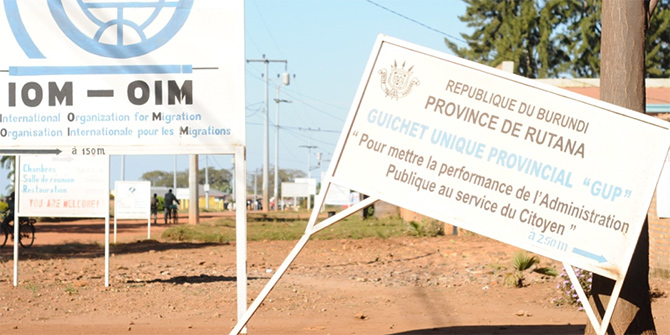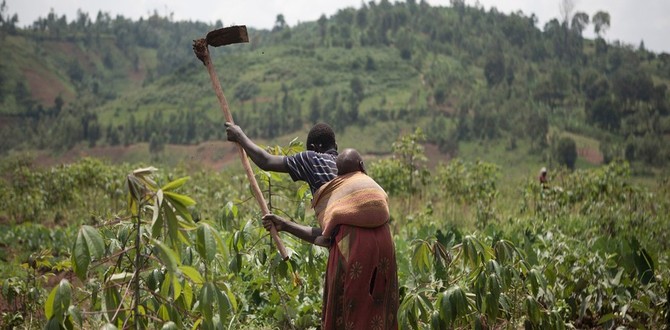Efforts at the decolonisation of knowledge production can be fraught with practical and theoretical hurdles. To upend the dominance of global North authors producing research on Burundi, the fourth annual conference of the Burundi Research Network on African soil, in Nairobi, was an opportunity to further these aims. But was this successful and are there dangers of reifying the current developmentalist frame?
This is the first post in the Idjwi Series.
While efforts to decolonise academia and knowledge production are evolving and maturing in African states, in Burundi these debates are trapped within a particularly tense political context. Indeed, expressing a position countering colonialism and neo-colonialism could be paradoxically perceived as supportive of the current regime, whose stance instrumentalises these debates to very different ends. Within the specific context of Burundi, what then are the motivations, opportunities and challenges encountered through the everyday practices of such decolonial ambitions?
With the aim to contribute to the decolonisation of research produced about Burundi, the 2019 Burundi Research Network (BRN) conference was held in Nairobi, Kenya in July 2019. This was the 4th annual conference of the network and the first ever BRN event to take place outside of universities in the so-called global North or West.
The Burundi Research Network is the result of various parallel efforts to foster connections between Burundi scholars globally, facilitating collaboration and nurturing peer-support amongst those researching the country – nationals and foreigners alike. This conference covered the themes of political crises, exile and knowledge production focusing on 1) regional approaches situating the Burundian crises within the geopolitics of East and Central Africa; and 2) epistemological approaches engaging with the decolonisation of research and the closure of the academic space in Burundi.
Extensive knowledge about Burundi is a fruit of the colonial enterprise, predominantly written by Western scholars. The decolonisation of knowledge hence challenges Westerners to recognise how Burundian or African scholars contribute to epistemic frameworks, with the aim of decentralising and decolonising knowledge produced about Burundi not only theoretical but pragmatic.
Since the first BRN conference in 2015, to which only a few Burundians were able to attend and contribute, the network made progress in opening this space to Burundian scholars, comprising 42 of the 52 authors selected to present their work. With immigration politics in Europe increasingly exclusionary and travel costs disproportionate (if not extortionate), organising a conference in Nairobi facilitated access for Burundians.
On the theoretical side, challenges specific to the Burundian context concerned the colonisation of knowledge. While broad references to the negative consequences of colonial experiences are frequent within scholarship on Burundi, academic endeavours that scrutinise in depth both physical and epistemic violence perpetuated by German and Belgian colonial indirect rules is missing. On the one hand, the blindness towards the harmful nature of colonialism and its legacies persists. On the other, the political instrumentalisation of the colonial critique by the current regime renders such research efforts particularly sensitive if not controversial within scholarly debates
Since 2015, Western states and international organisations denounced human rights violations and applied pressure through various channels including aid cuts. Burundian authorities dismissed the condemnations, suspended most international NGOs for several months and declared the United Nations Human Rights investigators persona non grata. Such actions have been justified in various speeches by Burundian officials with the neo-colonial nature of foreign interventions. Support from Western institutions to opposition and activists further complicates the situation. For these reasons, the colonial question remains sensitive. For Professor Evariste Ngayimpenda, the keynote of the conference, it may be unhelpful to attribute all of Burundi’s problems to colonialism.
With this decolonising agenda, the first day of the conference was dedicated to research methodologies. We jointly identified strategies to produce and disseminate research outputs and addressed issues of power asymmetry in the transfer of knowledge and the circulation of ideas, interrogating who dominates and profits from the endeavour. Participants also shared their research interests and their own research agendas.
An important gap between participants’ interests and actual programmes was recognised, caused by extremely limited funding opportunities, the imposition of research topics by (often foreign) funding bodies and the need to change a research topic due to both researchers and research participants’ life trajectories and security concerns (such as going into exile). Issues of self-censoring and lack of mentorship emerged as the main challenges. At the end of the discussions, some participants suggested creating a ‘Burundi chapter’ of the BRN as a specific space for more initiatives driven by Burundian scholars within Burundi itself. We think it is not only crucial to embrace such an initiative, but it is also extremely important for research on Burundi to be marked by stronger regional groundings. Of course such efforts would be impacted by the structural challenges Burundi faces.
Another key aspect in our approach included efforts to change the frame of understanding of political issues in Burundi. We chose to focus on a regional approach, to account for the lifepaths of citizens and political leaders being understood in relation to cross-border dynamics, and both keynote speakers dedicated their lectures to the issues of regionalisation, political crises and refugees, insisting on decolonising the epistemological frame of Burundi’s research.
Analysing diplomatic manoeuvring of the refugee phenomenon in East and Central Africa, the first keynote lecture, by Professor Evariste Ngayimpenda, highlighted how refugee flows 1) have been historically associated with security and displacement of not only people but also conflict and war across state boundaries; and 2) entangle regional dynamics with the politics and politicians that drive and simultaneously respond to them. Our second keynote, Dr Andrea Purdekova, interrogated the analytical frame of ‘crisis’ when applied to the Burundi events of 2015 and onwards. While the African Great Lakes Region has often been portrayed as a region with cycles of violence and displacement, she underlined empirically the misinterpretations induced by such conceptual frameworks. She further stated:
‘We shall not treat Burundi as a data collection point where we come to test theories and apply concepts devised elsewhere, but rather undertake research in Burundi to push for more complex theoretical models of how conflict, displacement and the state interact and mutually co-construct one another.’
As regionalisation and knowledge production are only some aspects of the epistemological frame when researching Burundi, other contributions represented the diversity of topics pursued by participating researchers. The network was delighted to see open academic debates among scholars, notwithstanding ongoing issues of (self-)censorship caused by the long legacy of violence perpetuated within education facilities, the willingness to stay in the country and the fear of repression. The imbalanced attendance, maybe ironically, assured that these debates were spearheaded and advanced by Burundian scholars, as opposed to being dominated by their Western counterparts, which tends to be case in other settings.
Engaging decolonisation of knowledge debates is wrought with trials and tribulations. We faced enormous challenges in organising a conference in a place few members of the organising committee knew well. It was extremely time consuming to navigate the bureaucratic requirements of institutions from four different countries with very different budgeting rules and timelines; a conference in a European university would have been much more straightforward to organise. We selected Kenya to host the conference as Burundians do not require visas to enter the country. Still, several participants could not attend due to multi-layered visa issues such as a lack of re-entry visas for Burundian participants temporarily based in Europe, or the length of time to process visas for Burundian refugees.
Another point to raise is that very few researchers from Western Universities reached this annual meeting – intended as a meeting for all scholars and not only Burundians. Maybe scheduling conflicts were to blame, but most likely the explanation rests in disconcerting structural issues: too far, too expensive, or not in line with the western academic ranking system. Such imbalanced interest and attendance subverted the decolonial aspiration of the conference. If predominantly Burundian researchers are reaching a conference in Nairobi, are we doing anything aside from reifying the developmentalist frame, albeit using a new vocabulary through which to do so?
To pursue such a decolonising agenda, we are organising a writing workshop to support dissemination of presented research by Burundian scholars. This workshop will be co-organised with the Centre for Public Authority and International Development, expanding participation to Congolese colleagues working on similar topics in line with this idea of regionalisation of knowledge. Such collaboration enables us to build on their experience of supporting African researchers in disseminating research outputs. Jointly, we aim to continue developing research capacities across countries and facilitating access to international research networks and journals. Stay tuned for these outputs!
The participation of thirty of the participants was enabled by the crucial financial support from the Open University (UK), IFRA-Nairobi (France), UCL/IACCHOS) (Belgium) and ARES (Belgium). The conference was held at three different places in Nairobi: IFRA, Columbia Global Centres Nairobi and PAWA254. We would like to thank to Marie-Aude Fouere and Marion Asego (IFRA), Emily Smith (Open University) and Pauline Muthoni (Columbia University, Columbia Global Centres), Emmanuel Klimis (Université Saint-Louis de Bruxelles) and Julien Moriceau (Université Catholique de Louvain and C-Lever), for their instrumental support to the organisation of the conference. See here for details about the conference, programme and its organising committee.
Photo credit: US Army Africa (CC BY 2.0).






Yes and YES. The paradigmatic perception of the North/South knowledge dispensation beeds to be redefined. Decolonising and de-lacalizing the knowledge is important. Thanks for the conference and workshop organizers. We are looking forward to more such events that would engage a diverse number of scholars from a multidisciplinary perspective.